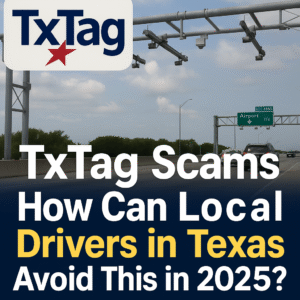Introduction
If you’re a Texas driver using toll roads, there’s a good chance you’ve received a text or email that looked like it came from TxTag. But before clicking on any link, you need to ask yourself:

Is this real — or just another scam?
In 2025, TxTag scams are spreading like wildfire, and thousands of Texans are being targeted with fake toll notices, phishing links, and fraudulent payment requests. This blog post will help local drivers understand the scam, identify red flags, and avoid becoming the next victim.
What Is TxTag?
TxTag is an official electronic toll collection system used on toll roads across Texas. Once you register, you receive a tag for your windshield that deducts toll fees automatically from your prepaid account.
Official site: https://www.txtag.org
Managed by the Texas Department of Transportation (TxDOT)
What Is the TxTag Scam in 2025?
The TxTag scam involves cybercriminals impersonating TxTag through texts, emails, and websites. These messages typically claim that you owe a toll or fine, urging you to click a link and make a payment.
But here’s the catch — the link redirects to a fake website that steals your payment details and personal information.
Real-Life Examples of the Scam
Scam Message Example 1:
“You owe $12.37 in tolls. Pay now to avoid late fees: txtag-bill.com”
Scam Message Example 2:
“Your TxTag account is suspended. Click here to update info.”
These URLs are NOT official. TxTag will only contact you from verified domains ending in .gov or txtag.org.
Why Texas Drivers Are Being Targeted
-
Widespread TxTag usage across major cities like Austin, Dallas, and Houston
-
Increased toll road traffic post-pandemic
-
Lack of awareness about digital phishing
-
Trust in official-looking texts due to the .gov-sounding names
How to Identify a Fake TxTag Message
5 quick ways to spot a scam:
-
Unusual URLs: Real TxTag URLs end in .org or .gov, not .com, .net, or anything sketchy.
-
Scare tactics: “Pay now or lose license” = red flag.
-
Typos and grammar issues: Official messages are professionally written.
-
Requests for sensitive info: TxTag won’t ask for full card numbers or SSN via SMS/email.
-
Suspicious timing: Did you even use a toll road recently?
How Can Local Drivers in Texas Avoid TxTag Scams in 2025?
1. Bookmark the Official Site Always use https://www.txtag.org to log into your account.
2. Don’t Click Links in Messages If you get a suspicious message, go directly to the official site instead.
3. Use the TxTag Mobile App Download the verified app from the App Store or Google Play to manage your account securely.
4. Set Up Account Alerts Enable SMS/email alerts inside your account settings so you only receive official notices.
5. Report Suspicious Activity Forward scam texts/emails to:
-
TxTag Customer Support: 1-888-468-9824
-
FTC Fraud Center: https://reportfraud.ftc.gov
How TxDOT Is Responding
The Texas Department of Transportation (TxDOT) has issued warnings about scam messages and recommends customers to:
-
Double-check URLs
-
Never enter info on third-party sites
-
Report all fraud attempts immediately
They’re also working to shut down scam domains and block fake numbers.
Actual Complaints from Drivers (2024–2025)
-
“I paid $18 via a text link before realizing it wasn’t real. My bank flagged it hours later.”
-
“Received three fake texts in one week claiming I owed different amounts.”
-
“A friend clicked on a link and got his credit card info stolen.”
People Also Ask (PAA)
Is TxTag a scam?
No, TxTag is a legit toll system, but scammers impersonate it with fake messages.
Are Texas drivers being scammed by TxTag scammers?
Yes. Especially in 2025, fake TxTag texts are targeting Texas toll users daily.
Are TxTag toll bills a scam?
Official bills are not scams, but scam texts/emails about toll bills often are.
Does TxTag text customers?
Yes, but only from official numbers and with proper identification.
How do I report a TxTag scam?
Report to TxTag support and the FTC. Save copies of the message as proof.
What is a text message scam in Texas?
A fraudulent message pretending to be a government or toll agency to steal your data.
Conclusion
Scammers evolve — but so can you. As a local driver in Texas, awareness is your strongest defense. With the right precautions, you can keep your data safe, your wallet secure, and your ride stress-free.If this guide helped you, share it with family, friends, and your driving community.


1zdbma